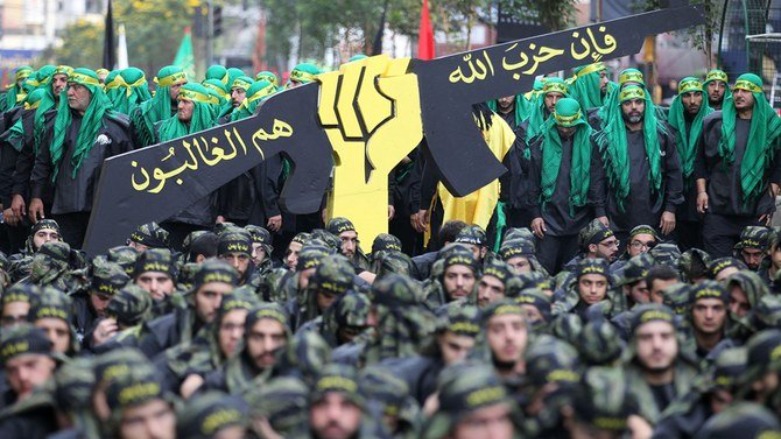Militias’ targeting of covert US sites in Kurdistan Region explained, with sentencing of spy for Lebanese Hizbollah

WASHINGTON DC (Kurdistan 24) - A translator for US Special Operations Forces in Iraq, Mariam Taha Thompson, was sentenced on Wednesday to 23 years in prison on charges of spying for the Lebanese terrorist group, Hizbollah. She pled guilty in March.
The information that Thompson provided is likely linked to recent strikes on two sensitive military and intelligence sites in the Kurdistan Region: the April 14 drone attack on a CIA hangar at Erbil Airport and the May 11 drone attack at an airfield in Harir, used by “the military’s highly secretive Joint Special Operations Command (JSOC),” as the New York Times reported on June 4.
The attack on the CIA hanger was widely known, but the Times’ report marked the first public revelation of the assault on the JSOC site in Harir.
Regarding the April 14 attack, “the covert nature” of the CIA facility and the strike’s sophistication “alarmed Pentagon and White House officials,” the Times said.
Almost certainly, the attack on the JSOC site in Harir a month later reinforced that alarm and, it, may well, even have created the impression that there was a spy for Iran and its militias among Coalition or Kurdish ranks.
Read More: Pro-Iran militias using ‘more sophisticated weapons’ against US forces in Iraq
The strikes on such sensitive facilities was also puzzling, because the Kurdistan Region is widely considered to be much safer for Westerners than Iraq proper.
So why should sensitive sites in the Kurdistan Region have been revealed to Tehran and its proxies?
The likely explanation was made public on Wednesday, when Mariam Taha Thompson was sentenced.
Falling in Love with a Hizbollah Agent
Thompson had a top-secret clearance and was working in Erbil, when she was arrested by US authorities on February 27, 2020. She had fallen in love with a Lebanese man who had ties to Hizbollah, and he tasked her to search government data bases—at least those she could access—as tensions built between the US and Tehran in late 2019 and early 2020.
There was no Kurdish betrayal of the Coalition—just a very foolish Arab-American!
Thompson, 62, born in Lebanon, received her US citizenship in 1993. Working as a contract linguist for the US military, in 2017, she began communicating with a Lebanese man, according to a Justice Department statement released on Wednesday.
“Using a video-chat feature on a secure text and voice messaging application,” the two communicated, the statement said.
“Over time, Thompson developed a romantic interest” in him, the statement continued, even though he divulged to her certain ties to Hizbollah. He said that he “had a family member who was in the Lebanese Ministry of the Interior” and that he had “received a ring from Hassan Nasrallah,” the head of Hizbollah.
In late December 2019, the US launched a series of airstrikes targeting Kata’ib Hizbollah, an Iranian-backed militia in Iraq, headed by Abu Mahdi al-Muhandis, who was also the deputy chief of Iraq’s Popular Mobilization Forces.
In 2009, the US had designated Kata’ib Hizbollah as a terrorist organization, while Muhandis’ links to terrorism go even further back:
Muhandis’ real name is Jamal Jafaar Mohammed, and he has been convicted in absentia for his role in the 1983 bombing of the US embassy in Kuwait.
On January 3, 2020, a US drone strike killed Qassim Soleimani, head of the Qods Force of Iran’s Islamic Revolutionary Guard Corps, along with Muhandis, who had welcomed Soleimani at the Baghdad airport, as he arrived from Damascus.
After that attack, the unidentified Lebanese man with whom Thompson had fallen in love, asked her “to provide ‘them’ with information about the human assets who had helped the United States to target Soleimani,” the Justice Department’s statement said.
“Thompson admitted that she understood ‘them’ to be Lebanese Hizbollah, including an unnamed high-ranking military commander,” it continued.
Subsequently, she “began accessing dozens of files, concerning human intelligence sources,” the statement explained, “as well as operational cables detailing information the assets provided to the US government.”
After she passed on that information, he told her that “his contacts were pleased,” the statement said, and “the Lebanese Hizbollah military commander wanted to meet Thompson when she came to Lebanon.”
Has the information Thompson gave Hizbollah been properly shared?
One would like to think that all the information that Thompson passed on to Hizbollah has been revealed to Kurdish, Iraqi, and any other relevant authorities.
Everything that she revealed is now in the hands of Iranian intelligence, and there may well be enhanced vulnerabilities at key locations.
Moreover, the information she provided Hizbollah may have been developed by Iranian intelligence to cultivate other sources and acquire additional, very sensitive, information.
Perhaps, that intelligence sharing has been properly done, and Kurdish and Iraqi authorities know all that they need to know to maximize their defense measures.
But that may not have happened, because of a “wall” that exists between the US Justice Department and the country’s national security bureaucracies.
They have two different purposes—and two different orientations—and they often do not share information.
That is particularly true of the Justice Department, whose criminal proceedings typically focus on the correct and proper implementation of US law, including the rights of the accused.
In the process, the Justice Department may neglect the national security implications of the crimes it is prosecuting, with lethal, even devastating, consequences.
Editing by John J. Catherine